Hinds Community College in Raymond
Mississippi was the site of the 2008 Annual
Conference of the Academy of Process
Educators. Held July 16-18 at the
picturesque Eagle Ridge Conference Center,
the conference featured an impressive hall
of teaching innovations, engaging plenary
speakers, informative workshops, a bus tour
of Vicksburg and surrounding battlefields,
and a delightful southern meal at the Walnut
Hills Restaurant. Participants from two
dozen higher education institutions joined
in sharing of best practices, networking
with other process educators, and planning
future activities of the Academy.
The theme for the 2008 conference was
Striving for
Quality: Aligning and Implementing
Continuous Improvement in Higher Education.
Dr. Daniel Apple facilitated the initial
keynote session by using an interview format
to discuss the five principles of
politicking in higher education with Dr.
Clyde Muse, president of Hinds Community
College. Dr. Muse identified the five
principles of politicking as connecting with
your values, knowing your facts, creating a
thoughtful plan, modifying the plan with
stakeholder input, and pati ently
facilitating decision-making. He gave
examples to illustrate how he involved
stakeholders at various levels in the
Mississippi community college system who
stand to be impacted by new projects or
fiscal changes. It is essential to listen
carefully, to respect opinions, to have a
plan, to exercise leadership at key
junctures, and, very importantly, to "get
there first."
ently
facilitating decision-making. He gave
examples to illustrate how he involved
stakeholders at various levels in the
Mississippi community college system who
stand to be impacted by new projects or
fiscal changes. It is essential to listen
carefully, to respect opinions, to have a
plan, to exercise leadership at key
junctures, and, very importantly, to "get
there first."
Dr. Steven Spangehl, director of the
Academic Quality Improvement Program (AQIP)
of the Higher Learning Commission, focused,
in his keynote presentation, on the
importance of the conference theme of
implementing good processes to produce good
results. He described how accrediting
organizations have shifted focus from
measuring inputs (e.g., financial and
facility resources, SAT/ACT scores of
entering students, and headcounts) to
measuring outputs (e.g., student success,
graduation rates, community engagement, and
regional economic development). Dr. Spangehl
stressed that processes need to be designed
and good designs should make processes
consistent, effective, and proactive rather
than reactive.
Dr. Eric Clark, Executive Director of the
Mississippi Board of Community and Junior
Colleges, outlined, in his keynote, how the
state has been able to close the gap in
earnings differentials with the rest of the
country over the last thirty years. This has
been accomplished, in large part, by
focusing on educational needs of the
citizens and gathering outcome data about value-added changes in
income and other measurable outcomes that
justify the financial investments in
education. Dr. Clark described how
leveraging the significant potential of
students from diverse backgrounds who need
and want more education, and by building
collaborations with many new industries and
manufacturing complexes, the state has
accomplished many win-win improvements for
its citizens.
outcome data about value-added changes in
income and other measurable outcomes that
justify the financial investments in
education. Dr. Clark described how
leveraging the significant potential of
students from diverse backgrounds who need
and want more education, and by building
collaborations with many new industries and
manufacturing complexes, the state has
accomplished many win-win improvements for
its citizens.
Lt. General Russel Honoré, who played a
significant role in managing the
post-Katrina rescue and clean-up efforts in
New Orleans, reminded everyone how much we
need to "restack our values deck" in order
to proactively prepare citizens for their
roles in a sustainable economy, including
readiness and skills to deal effectively
with natural , as well as social, disasters
that should be expected in the coming
decades. General Honoré repeatedly
recognized the key role that educators and
the education system have in making the
future better for everyone.
The core of the conference was parallel
workshop sessions that featured best
practices and action research in curriculum
design, facilitation, assessment, and
faculty development. These included new
methodologies, tools, and resources that
will enrich the next edition of the
Faculty
Guidebook and the inaugural
issue of the
International Journal of Process Education.
Wisdom gained over many years of experience
with process education, as well as insights
produced through conference interaction with
those new to process education, were
inventoried in a final plenary facilitated
by Dr. Daniel Apple and Dr. Betty Lawrence.
Participants were excited to see many of
these principles and teaching/learning
methods already documented in on-line
resources available at
www.pcrest.com/LO.
The theme for next year’s conference is
Measuring Success
in Higher Education. The location
will be Gaston College in Dallas, North
Carolina, just outside Charlotte. Look for
the call for papers and information about
registration at
www.processeducation.org. Be
part of the annual celebration of success in
the classroom through process-centered
education and meet enthusiastic as well as
talented educators from all disciplines and
all parts of the country!
